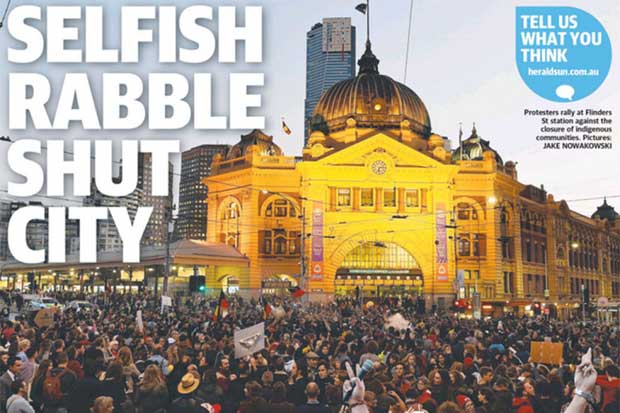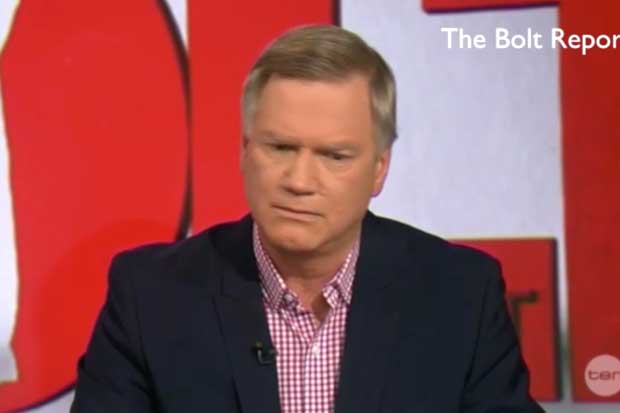For a white, well-paid, widely read columnist, Andrew Bolt likes to talk an awful lot about racism. Of course, ever the martyr, Bolt’s focus is the ‘racism’ directed towards him and his kinfolk, not by those who have been historically discriminated against, dispossessed, disenfranchised and disempowered, since the invasion of their country.
That historical discrimination seeps into current-day government policy.
Last Friday, tens of thousands of people – both Aboriginal and non-Aboriginal – turned out in force to protest just one of these policies, the WA Premier Colin Barnett’s plans to close up to 150 remote Aboriginal communities.
It was the second national day of action within two months, and followed successful protests in Melbourne and Sydney in April.
Not only were protests staged in capital cities, but there were strong turnouts in regional towns – from Cairns, to Foster, from Albury to Geraldton. Smaller communities – like Yarrabah in Far North Queensland and people directly affected in Western Australia in places like Beagle Bay, Newman, Port Hedland and Geraldton – also aired their cries on the streets.
The day of action even gained international solidarity, with protests in New Zealand, Germany and Hong Kong, among others.
After attracting 3,000 protestors to march through Brisbane, a smaller contingent of 300 staged a sit-in at the city hall.
The second national day of action was truly an historic moment. The ability to mobilise so many across the country, not once, but twice, within two months of each other speaks to the outrage that will hopefully end up suffocating Barnett’s plans to close these communities.

In April, the Melbourne rally shut down the CBD and provoked condemnation from the cities’ mainstream press, with the label ‘Selfish Rabble’ splashed across the nation’s most read newspaper the Herald Sun.
About 12,000 people in Melbourne were able to replicate that April protest, shutting down the CBD again on Friday and drowning out the whines of conservative talk back hosts like Neil Mitchell, who were insulted at the inconvenience to Melbourne commuters, particularly those going to the AFL, but less worried about the effect of a disastrous policy on the lives of Australia’s most vulnerable.
But that didn’t stop the Herald Sun’s Bolt weighing in again with his characteristic inaccuracy.
History is not Bolt’s strong point, and neither is race relations.
This morning, he wrote fiercely about the “race warriors” who are tearing Australia apart. According to Bolt, he no longer feels reconciled.
“Take pity on this torn country! I doubt I’m alone in feeling less reconciled and more threatened than ever, and wonder how much worse this divisiveness will get,” he wrote, as if he was threatened every day by angry blackfellas.
Of course, there are few blackfellas in the country who would want to reconcile with Andrew Bolt. Before reconciliation there must be justice and equality, and Australia has proven time and time again unwilling to even consider it. Bolt has proved himself nothing more than an insolent child, from his campaign to undermine the pain of the Stolen Generations, to his martyrdom on the altar of free speech due to his determination to discredit ‘white Aborigines’ for the good of the taxpayer.
While Australia likes to talk in ‘r’ words – from Reconciliation to Recognition – it has trouble discussing the most pertinent one of all, racism.
That’s something Bolt has no trouble bringing up, but I feel as if someone could direct him to a better definition, not one just plucked from his imagination.
Bolt claims that Friday’s protests were racist because they were a “collective punishment of mainly white Australians in Melbourne in return for what white politicians on the other side of the country have allegedly done to black Australians”.
But it is hardly “collective punishment”. What is more collective punishment than the type dealt to hundreds of thousands of Aboriginal people across history, simply for the fact they are Aboriginal?
Aboriginal people for so long have been an inconvenience for Australia, which despite building prosperity off black slavery and rights abuses, and ripping mining wealth from stolen land, would prefer the protests of blackfellas to be out of the way and regulated to a few hours outside of peak hour.
They want it regulated to a time when the huge injustice proposed for WA communities will not be placed uncomfortably right in front of their eyes. This is how Australia has dealt with its history – placing it out of sight and out of mind. The Melbourne protests, and those around the country, were a clear sign that Aboriginal people are no longer willing to play out that farce. They aren’t going to play by your rules, even if AFL is involved.
The protests in capital cities carried the cries of WA’s communities out of their remote homelands and into the bustling metropolis. It seems barely a sacrifice to inconvenience Melbourne commuters for two hours to air Australia’s most inconvenient truth.
As Warriors of the Aboriginal Resistance (WAR)’s Pekeri Ruska told the Age, “We want to give Melbourne a taste of what it’s like to have your town shut down.”
Nevertheless, Bolt thinks its racist for “protestors to demand Australians keep paying some $80,000 a year per inhabitant to provide services for largely dysfunctional settlements that would be closed down if the inhabitants are white”.
I don’t know where he’s getting his information from, but the reality is the opposite. The remote communities are being targeted because they are Aboriginal, and shut down because they are Aboriginal. No other Australian citizens are starved off their communities because of a stupid fiscal decision. The dysfunction within these communities stems directly from the systematic failures by successive governments to invest in them appropriately, and to deal with the trauma of hundreds of years of dispossession which feeds into the current suicide crisis and alcohol and drug abuse. It stems from the rising Indigenous incarceration crisis, and the housing, health and other failings that strangle the futures of Aboriginal people in remote Australia.
Aboriginal people shouldn’t be penalised yet again for their poverty. They shouldn’t be on the losing end of political buck-passing between federal and state governments. They shouldn’t be disempowered even further by being refused their international right to free, prior and informed consent. The talk of closing down their communities has been played out in the media, and not out amongst the very people it will affect, raising suspicion and fear.
It may be inconvenient for Bolt to write the truth about Australia’s black history, but the greater inconvenience of his lies is to Aboriginal Australia, because his racist rants are aired every week in the nation’s most widely read newspaper.
Nevertheless, while the propagandists like Bolt find one audience in Australia, the protests across the country on Friday left a greater mark than any of his misguided utterings.

The Guardian was the only major news outlet to give the protests extensive coverage, with Darwin-based reporter Helen Davidson running a beautifully curated live blog of the days’ events.
But while the mainstream media barely covered the protests without mentioning the inconvenience to commuters, social media was swamped with support.
No other state government policy has garnered such a response, and attracted this level of solidarity from other parts of Australia. No other state government policy has moved so many people – both Aboriginal and non-Aboriginal – out of their complacency and into direct action on the streets.
The NT intervention was built upon a media-driven moral panic over child sexual abuse in NT communities, but was essentially about the rights of Aboriginal people to control their own future, and the future of their own communities – similar to the arguments surrounding WA communities.
In fact, Barnett has also tried to use domestic violence and child sexual abuse in these communities to justify closing them – a similar line used to cushion a military intervention into NT communities. But while the NT intervention is one of Aboriginal Australia’s most enduring and blatant rights’ abuses, the numbers who turned out to protest it fell far short of those who shut down capital cities against the WA forced closures.
Colin Barnett clearly needs some lessons on playing the race card from John Howard and Mal Brough, as does Tony “Lifestyle Choices” Abbott. Because on the eve of the rallies, Barnett tried to change his rhetoric on the issue.
Premier Barnett told the Australian newspaper the plans would be years or decades into the future, and would involve resourcing bigger centres at the expense of smaller, remote communities.
“Looking somewhere into the future, I’m talking years and decades, what I would like ultimately to see and what we are trying to achieve is that some of those larger communities would become ultimately gazetted towns like any other town and operate that way,” Mr Barnett told the Australian.
“That is going to take some time. Then there will be some remote communities which will be supported from the outside to a greater extent (than others) and that will cater for the largest portion of Aboriginal people. But the very small communities I think will lapse over time.”
Despite the Australian reporting his comments as some kind of back-down, this change in rhetoric is insignificant. There has been a concerted effort across the country to move Aboriginal people off their homelands by starving them off and re-directing resources to bigger centres. The NT government’s Growth Towns policy was precisely this – designed to force Aboriginal people from outstations and into 20 growth hubs.
The growth towns policy, which led to the resignation of one of Aboriginal Australia’s strongest politicians – Marion Scrymgour – from the Labor party, while similar to Barnett’s plans, did not garner the level of support from wider Australia, who were accustomed to viewing NT Aboriginal communities as depravity hubs through broad brushstrokes wielded by media.
Barnett’s renewed rhetoric, although a clear attempt to deflect the heat of outrage currently peeling the face off his government, essentially have the same disastrous consequences for Aboriginal people who have a right to live on their homelands, where research shows they are healthier, and happier.
That may be inconvenient to Barnett and Bolt, but it as an inconvenience we have to hear.
Donate To New Matilda
New Matilda is a small, independent media outlet. We survive through reader contributions, and never losing a lawsuit. If you got something from this article, giving something back helps us to continue speaking truth to power. Every little bit counts.




